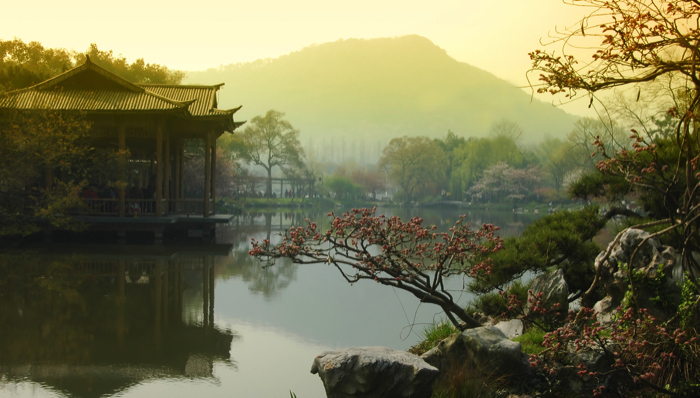Translated By Andrew Yang
The Tang dynasty (618-907) scholar Chang Jian (708-765), together with Wang Wei (699-759), Wang Changling (698-756) and other known poets, often visited Buddhist temples. One of his poems, titled Written for the Chan Garden Behind the Broken-hill Temple, is typically otherworldly and subtly ethereal.
Early morning I enter an olden temple,
The sun on tall woods dawning.
Leading to seclusion is a winding trail,
Deep in flora, a Chan retreat perching.
Birds, the mountainscape delights.
The mind, a pond shade clears.
Now over everything stillness prevails,
Except for the tolling of bells.
The poet comes to the ancient temple in early morning to worship Buddha. All the way up the mountain and full of joy, he notices towering trees bathed in a rosy glow of dawn. A quiet, meandering trail takes him to a sequestered meditation cabin hidden among plants and trees.
The poet was good friends with Wang Wei who, as a lifelong devout Buddhist and a strict vegetarian, was a well-known lay practitioner of Chan. Under his steady influence, Chang Jian developed a fondness for meditation. Encountering the Chan lodge here immediately reminds him of the meditative merit and virtue and of a saying, “A stick of pure incense holds innumerable doors to the Dharma, and all karmic bonds be let go to deeply query who is chanting Buddha’s name”.
By now, the mountain scene along the footpath looks vividly fresh with birds darting and chirping spontaneously. As the poet comes upon a clear pond next to the meditation hut, reflections in its depths of water, as pure as water in the mere itself, seem to merge his body and mind into the void.
At this moment with the sun dawning, in an aged temple among lush greenery next to a site for Chan practice, and on a mountain slope beside jade-like pond water, everything seems still. This profound quietude is no mere calmness, but something of an otherworldly serenity. There is movement in stillness, with both movement and stillness coming into one, into a state that transcends human delusion and gratuitous differentiation.
In an instant, the only noise one picks up is that from the Broken-hill Temple sangha chanting a sutra while lauding Buddha, with the booming toll and chimes of bells reverberating through the air, ringing time and again and sounding rhythmically sonorous. All this conveys a seeming eternal peacefulness and innate tranquility that ultimately blends the poet’s Chan state of mind into the incredible depths of the universe.
Much of the landscape poetry produced during prime Tang entails a refined hermit-like keenness for seclusion, rendering it elegant yet laidback. This poem about spiritual revelation was composed in a monastery, with a mountainscape idyll and a style that is plain and natural. Yet again, artistically, it differs from either Wang Wei’s subtlety or Meng Haoran’s (689-740) simplicity, with an unpretentious tone that radiates vigour and solidity. Thus, it involves not only poetic, visual richness, but also an intriguing tang of Chan. It is indeed a worthy piece of poetic creation from the Tang era embracing Chan.
Fundamentally, during his visit to the temple, the poet is able to eliminate all worldly thoughts and let go of the clamours in everyday life, to fill his mind with simple joy. In the meantime, if he were to look back over the past, it would now seem most likely as if he were standing erewhile on the far side of an ocean. The past, all too often full of helter-skelter not unlike a noisy bout of fireworks, was one of undue conflict, commotion and confusion, so sullied it would hardly be worth another glance.
Friends, if you are keen and earnest, you might as well join the ranks of Buddhist practitioners and let Dharma water wash away all the dirt and grime from your soiled mind.

